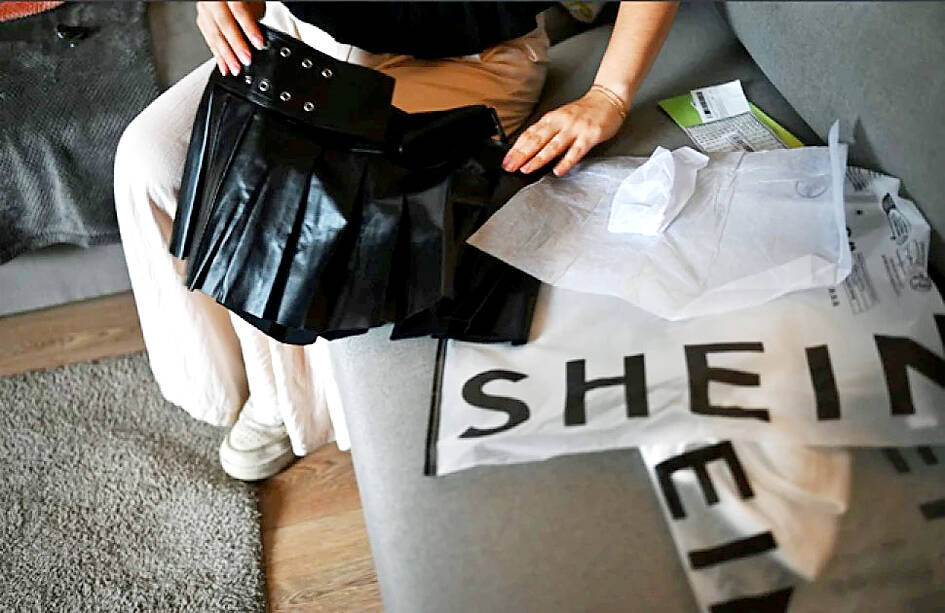From sizing advice via selfies to robot stock-takers, online shopping behemoths have increasingly turned to artificial intelligence (AI) in a bid to stem the flow of bad-for-business clothes returns.
Up to 30 percent of fashion items bought on the Internet are sent back, according to study late last year by consulting firm McKinsey and the Business of Fashion Web site — not least because “clients are buying several sizes or styles and returning most of them.”
That practice drags down profit margins. Each returned package costs between US$21 and US$46 on average given the costs of transport, treatment and making the item fit for selling again, a separate McKinsey study said.

Photo: AFP
SIZING ISSUE
“Seventy percent of returns are linked to a sizing issue,” said Zoe Tournant, whose company Fringuant markets an AI-driven algorithm to fix that, charging clients between 5,000 to 100,000 euros (US$5,240 to US$105,000) a year.
Armed with the customer’s height, weight and a quick selfie taken on the phone, the French-based start-up promises shoppers a better idea of what size would fit them best.
“With the selfie we detect their age, gender” to help “refine” the image of the customer’s body fed into its AI model, trained for a year on thousands of photos, Tournant said.
Within seconds, that model is then matched up with the garment’s dimensions provided by the brand to tell shoppers whether a jumper “falls perfectly on the shoulder” or if there are “doubts at the level of the hips” for a pair of trousers.
Tournant said her firm has about 20 clients, including upmarket womenswear label Maje, which she claimed has seen a dramatic drop in returns.
Similarly tempted by AI’s promise, Zalando acquired Swiss start-up Fision in 2020, one of a raft of companies working in the size-prediction niche.
Since July 2023, the German heavyweight retailer has adopted its own AI-driven sizing tool where customers help avoid returns “by taking two photos of themselves with their phone while wearing tight-fitting clothes,” Zalando said.
SHIPPING ERRORS
Besides sizing, e-commerce firms are also counting on AI to help avoid returns caused by shipping errors and automate their stock counts.
At ID Logistics, which operates in 18 countries, the order pickers’ trolleys are equipped with a smart camera to check that the color or size of the product retrieved from the shelves matches the order.
The device immediately alerts the worker if they have picked up the wrong item.
In less than two years, this camera has “reduced by 90 percent” the number of incorrect parcels, ID Logistics director of development and innovation Ludovic Lamaud said.
Elsewhere in the warehouse, an independent robot “rammed with AI” likewise maps the premises to “update the stock according to what it sees,” processing “6,000 to 30,000 pallets a night.”
“The right stock prevents preparation errors and therefore returns,” Lamaud said.

VAGUE: The criteria of the amnesty remain unclear, but it would cover political violence from 1999 to today, and those convicted of murder or drug trafficking would not qualify Venezuelan Acting President Delcy Rodriguez on Friday announced an amnesty bill that could lead to the release of hundreds of prisoners, including opposition leaders, journalists and human rights activists detained for political reasons. The measure had long been sought by the US-backed opposition. It is the latest concession Rodriguez has made since taking the reins of the country on Jan. 3 after the brazen seizure of then-Venezuelan president Nicolas Maduro. Rodriguez told a gathering of justices, magistrates, ministers, military brass and other government leaders that the ruling party-controlled Venezuelan National Assembly would take up the bill with urgency. Rodriguez also announced the shutdown

Civil society leaders and members of a left-wing coalition yesterday filed impeachment complaints against Philippine Vice President Sara Duterte, restarting a process sidelined by the Supreme Court last year. Both cases accuse Duterte of misusing public funds during her term as education secretary, while one revives allegations that she threatened to assassinate former ally Philippine President Ferdinand Marcos Jr. The filings come on the same day that a committee in the House of Representatives was to begin hearings into impeachment complaints against Marcos, accused of corruption tied to a spiraling scandal over bogus flood control projects. Under the constitution, an impeachment by the

Exiled Tibetans began a unique global election yesterday for a government representing a homeland many have never seen, as part of a democratic exercise voters say carries great weight. From red-robed Buddhist monks in the snowy Himalayas, to political exiles in megacities across South Asia, to refugees in Australia, Europe and North America, voting takes place in 27 countries — but not China. “Elections ... show that the struggle for Tibet’s freedom and independence continues from generation to generation,” said candidate Gyaltsen Chokye, 33, who is based in the Indian hill-town of Dharamsala, headquarters of the government-in-exile, the Central Tibetan Administration (CTA). It

A Virginia man having an affair with the family’s Brazilian au pair on Monday was found guilty of murdering his wife and another man that prosecutors say was lured to the house as a fall guy. Brendan Banfield, a former Internal Revenue Service law enforcement officer, told police he came across Joseph Ryan attacking his wife, Christine Banfield, with a knife on the morning of Feb. 24, 2023. He shot Ryan and then Juliana Magalhaes, the au pair, shot him, too, but officials argued in court that the story was too good to be true, telling jurors that Brendan Banfield set